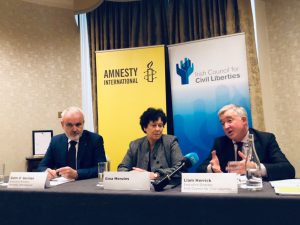Dublin, 22 October 2018
At a press conference in Dublin today, Amnesty International Ireland and the Irish Council for Civil Liberties (ICCL) made a joint call on the electorate to vote Yes to removing the word “blasphemous” from Article 40.6.1 of the Constitution. They were joined by the theologian, Gina Menzies. They outlined how a Yes vote in this October 26th referendum would support freedom of expression here and around the world, and would have no impact on the rights of followers of any religion or belief.
Speaking today, Liam Herrick, ICCL Director, said:
“Freedom of expression is at the heart of our democracy and that must include allowing all speech that challenges, or even ridicules, ideas or institutions. Criminalising blasphemy has no place in a modern democracy such as ours. Irish people don’t want criminal prosecution for those who call into question the authority of religious teachings. This is not to mention the fact that the courts are not equipped to arbitrate what is, or is not, a genuine religious teaching.
“With the marriage equality and repeal the 8th referendums, Ireland has taken important steps to bring our Constitution in line with our progressive society. This is another chance to do the same.”
ICCL’s policy paper Vote YES for freedom of speech!: https://www.iccl.ie/human-rights/vote-yes-freedom-speech/
Colm O’Gorman, Amnesty International Ireland Executive Director said:
“This referendum is about valuing freedom of expression, not eroding freedom of religion or belief. Religious freedoms are protected in a different Article of the Constitution, Article 44.2.1. A Yes vote would mean that simply offending people is not a crime. Inciting hatred on religious grounds would still have to be prohibited in law. The government would still have to ensure people can practise their religion without discrimination, threats or violence.
“At a time when freedom of expression is under attack around the world, this referendum really matters. It would mean States like Pakistan can no longer justify their own severe anti-blasphemy laws by pointing to our Constitution. In Pakistan, those accused of blasphemy include minority religions like Christians, who are subject to harassment, imprisonment and even the death penalty.”
Gina Menzies said:
“The blasphemy clause doesn’t protect freedom of religion and belief, in fact it undermines it. The Irish Churches, Catholic and Protestant, recognise the impact of blasphemy in a number of countries, where torture, persecution and the death penalty are used to oppress minority religions. If passed, this referendum allows Irish law to protect both freedom of speech and freedom to practise one’s religion or beliefs.”

L-R Colm O’Gorman, Gina Menzies, Liam Herrick
ENDS
Note to Editors
Gina Menzies is a Catholic theologian and a lecturer in bioethics. She is a frequent guest on broadcast media and contributes to the Irish Independent and the Irish Times. Gina is a member of the reform movement, We Are Church Ireland.
ICCL’s policy paper Vote YES for freedom of speech!: https://www.iccl.ie/human-rights/vote-yes-freedom-speech/
Amnesty International Ireland’s position on this referendum is explained here: [link to https://www.amnesty.ie/blasphemy-referendum/]
Background
Article 40.6.1 of the Constitution says that people in Ireland have the right “to freely express their convictions and opinions”. It sets limits on this freedom of expression: “organs of public opinion” cannot be used to “undermine public order or morality or the authority of the State”. It also says that the “utterance or publication of blasphemous … matter” must be a criminal offence. For this reason, the Defamation Act 2009 created the criminal offence of “blasphemy”, with a possible fine of €25,000.
The Law Reform Commission reviewed this provision in 1991, and concluded that “there is no place for an offence of blasphemous libel in a society which respects freedom of speech”. It recommended that it be deleted from the Constitution. So too did the Constitution Review Group in 1996, the Constitutional Convention in 2013, and the UN Human Rights Committee in 2015.
The Irish Catholic Bishops’ Conference and the Church and Society Commission of the Church of Ireland have recently described the blasphemy provision in the Constitution as “largely obsolete”. Both have also stated concern at how blasphemy laws like Ireland’s are used to justify violence and oppression against minorities in other parts of the world.
Media contacts:
Amnesty International Ireland: Kate O’Sullivan, Communications Manager. +353 (0)85 8148986, media@amnesty.ie
Irish Council for Civil Liberties: Sinead Nolan, Public Engagement and Communications Officer. + 353 (0)87 415 7162

